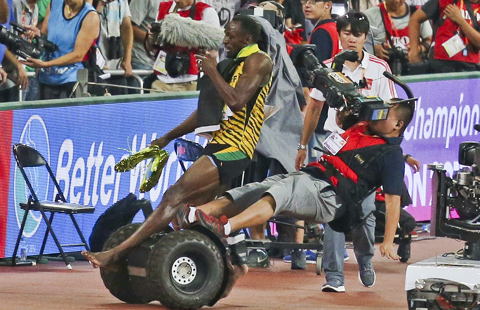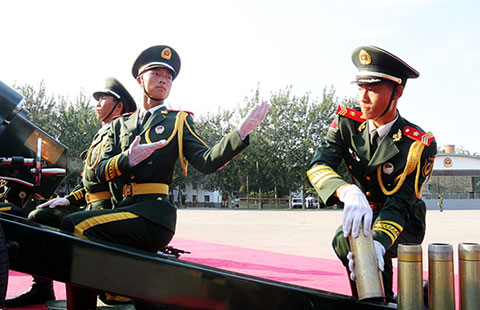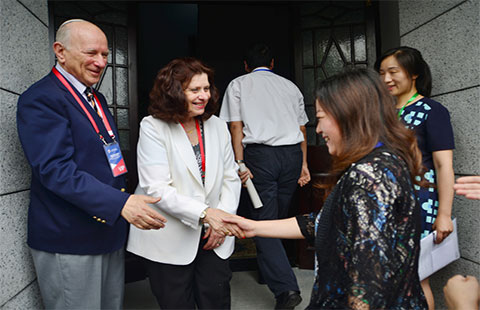Stiffer gun control unlikely, experts say
Updated: 2015-08-29 07:21
By Agence France-Presse in Chicago(China Daily)
|
|||||||||
With mass shootings all too common, it appears that no place in the United States is safe from carnage - not churches, not schools, not even the morning newscast.
The shocking on-air murder of a 24-year-old reporter and a 27-year-old cameraman by a disgruntled former colleague on Wednesday has once again renewed calls for stricter gun controls.
That is simply not going to happen, experts said, and the trend in recent years has actually gone in the opposite direction.
"You can't get rid of them," said Harry Wilson, a professor at Virginia's Roanoke College, near the scene of the latest shooting.
A landmark 2008 decision by the US Supreme Court outlawed major restrictions on gun ownership by ruling that the constitutional right to bear arms included the right to keep a loaded handgun for self-defense.
The government can still impose some restrictions, such as prohibiting convicted criminals and the mentally ill from owning guns and requiring background checks before purchase.
But the political climate has led to a drastic loosening of gun controls in recent years, despite the many calls to the contrary following a series of increasingly horrific mass shootings.
US President Barack Obama pushed hard, but failed to restrict the sale of military-style assault rifles and failed to strengthen background checks after 20 children were killed in a shooting at a Newtown, Connecticut, elementary school in December 2012.
Robert Spitzer, a professor of political science at State University of New York at Cortland who has published four books on gun control, said, "We've not seen any movement on national gun law changes in recent years because of the Republican party's ascendance at the national level and also because the gun lobby is very effective politically at mobilizing their supporters."
Republicans are closely aligned with gun-rights supporters.
"Also, the gun lobby has been fairly effective at advancing its message that gun laws don't really matter," Spitzer said.
"There is mounting evidence that gun laws do matter - especially on people who ought not to have access to guns - but that is not the prevailing political message that many or most Americans hear, which is that gun laws only restrict honest people and don't have an effect on people who would do bad things with guns."
There has been a substantial shift in public perceptions since Obama was elected in 2008.
In surveys conducted by the Pew Research Center in the 1990s and early 2000s, about a third of US citizens said it was more important to protect gun rights than to control guns. That jumped up to 45 percent in the years following Obama's election and was up to 50 percent in July.
When asked about specific policies, however, up to 85 percent of Americans were in favor of requiring background checks at gun shows and in private sales, laws preventing the mentally ill from buying guns and creating a federal database to track gun sales.
An "intensity gap" is often cited as the reason why even these so-called common-sense measures are not enacted.
Gun rights supporters are fervent and well-organized. While there has been a surge in new gun-control advocacy groups in recent years, they remain outnumbered and outspent.
Guns are also a potent symbol of freedom, patriotism and individualism in the United States, said Jim Taylor, a sociology professor at Ohio University.
(China Daily 08/29/2015 page8)

 Bolt 'somersaults' after cameraman takes him down
Bolt 'somersaults' after cameraman takes him down
 A peek into daily drill of ceremonial artillery unit
A peek into daily drill of ceremonial artillery unit
 93-year-old's murals save Taiwan's 'Rainbow Village'
93-year-old's murals save Taiwan's 'Rainbow Village'
 Top 8 novel career choices in China
Top 8 novel career choices in China
 Hairdos steal the limelight at the Beijing World Championships
Hairdos steal the limelight at the Beijing World Championships
 Chorus of the PLA gears up for Sept 3 parade
Chorus of the PLA gears up for Sept 3 parade
 Iconic Jewish cafe 'White Horse Coffee' reopens for business
Iconic Jewish cafe 'White Horse Coffee' reopens for business
 Beijing int'l book fair opens new page
Beijing int'l book fair opens new page
Most Viewed
Editor's Picks

|

|

|

|

|

|
Today's Top News
China takes historical silver in men's 4x100m
Surviving panda cub at National Zoo is male
China eases rules for foreigners to buy property
Ministry denies troops sent to reinforce DPRK border
Stem cell donor offers ray of hope for US boy with leukemia
All creatures great and small help keep V-Day parade safe
China not the only reason global stock markets are in a tailspin
Market woes expected to delay Fed hike
US Weekly

|

|







